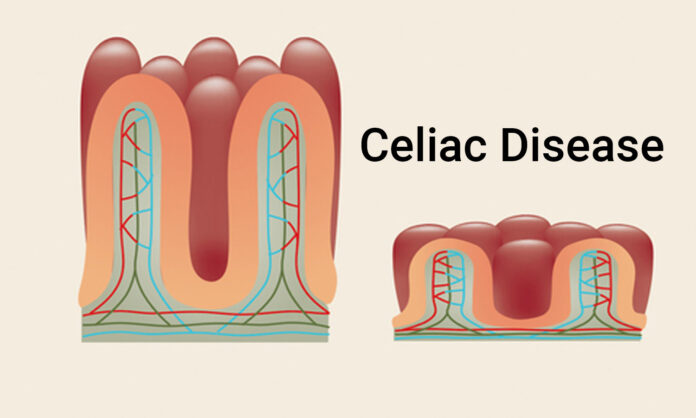
Table of Contents
Coeliac disease is a digestive disorder that attacks the intestine of our body. Our small intestine is responsible for absorbing every nutrient we consume. In easier words, the immune system destroys the intestine lining whenever a person consumes gluten.
Coeliac disease is challenging to diagnose because every person reacts differently to gluten sensitivity. Some people don’t show any symptoms of coeliac disease but are tested positive in their coeliac test. The reason is still uncertain.
However, people with gluten sensitivity are at higher risk of developing severe complications if they show apparent symptoms.
What Is Coeliac Disease?

Coeliac disease is an autoimmune digestive disorder. The immune system attacks the intestine lining whenever a coeliac disease patient eats anything with gluten.
The most damaging part of coeliac disease is that it destroys the gut’s ability to absorb nutrients. When an individual consumes gluten-rich food, the villi (lining of the small intestine) wear down, making it difficult for the body to absorb nutrition.
What is Gluten?

Gluten is a protein in foods like wheat, rye, and barley. Gluten adds elasticity to grains like wheat etc., to hold them together. It is also added to other foods to extend their shelf life.
Symptoms of Coeliac Disease
The diagnosis of coeliac disease may take several months or even years. However, if you notice any of these symptoms, booking a coeliac test can be wise.
Common Symptoms

Some people don’t show apparent symptoms until the disease has reached its worst stage. Knowing the signs can help you address the condition before it’s too late.
- Abdominal pain
- Nausea
- Fluctuating weight
- Poor appetite
- Bloating
- Muscle cramps
- Migraine
- Hair loss
- Constipation
- Mouth sores
- Skin discolouration
Symptoms in Adults
People with coeliac disease never show prominent symptoms. Especially those with prolonged disease mostly show signs of gluten sensitivity in their mid-20s. The symptoms may include
- Cognitive impairment
- Constant headache
- Irregular periods
- Canker sores
- Dermatitis Herpetiformis
- Hyposplenism (Poor spleen function)
- Osteoporosis
- Peripheral neuropathy
- Osteomalacia
Symptoms in Children

Coeliac disease is more common in children and young adults. It can be severe for children since their gut health is important for their growth and development. Some symptoms of coeliac disease in children may include;
- Ruined teeth enamel
- Poor weight
- Delayed puberty
- Mood swings
- Short height
- Slowed growth
- Joint pain
- Weak bones
Long-Term Complications of Coeliac Disease
Untreated or undiagnosed coeliac disease can lead to long-term and severe damage to your health. Some common complications of coeliac disease are;
Malnutrition – It is common for children with coeliac disease. People with gluten sensitivity have poor gut health. Hence, their ability to absorb nutrition is very little. Malnutrition in children and adults can result in weight loss and anemia.
Infertility & Miscarriage – Poor absorption of vitamin D, iron, and calcium in women contribute to menstrual and pregnancy issues.
Cancer – Adults with coeliac disease who don’t maintain a gluten-free diet position themselves to develop certain cancers, such as bowel cancer, intestinal lymphoma, or skin cancer.
Final Words
Early detection of gluten sensitivity can save you from long-term and complicated health issues. If you are experiencing any of the above symptoms or difficulties, consulting a doctor and taking the coeliac test should be your priority.
















